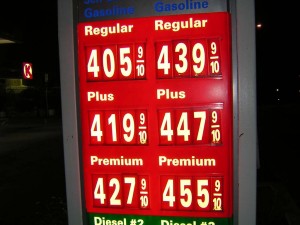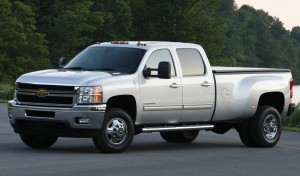
A rarity a month ago, $4 gas is now the national norm, some expecting $5 prices in a matter of months.
Late last year, when former Shell President John Hofmeister warned that the U.S. could see $5-a-gallon gas prices by 2012, few took the executive seriously.
“The wolf is out there,” acknowledged Tom Kloza, chief analyst with the Oil Price Information Service, and “we’ll see those numbers at some point this decade, but not yet.
Anyone who has had to fill up lately is starting to take Hofmeister’s dire forecast very seriously. In Michigan, prices rose almost 20 cents in the last week, a pace seen across much of the country. The Los Angeles area is already approaching the $5 mark, at least on premium fuel, and virtually the entire country is now over the $4 mark for unleaded regular at self-serve pumps.
The surge in fuel costs is triggering a political free-for-all, President Barack Obama blasting the oil companies and demanding an end to oil company subsidies, while wild-card Republican Donald Trump has suggested the U.S. simply grab Mideast oil sources.
Ken Reidy, a contract trucker who maintains his own 18-wheel rig, said he didn’t care about the politics, “as long as someone helps me cut my fuel bill.” Fueling up at a truck stop along Michigan’s I-94, Reidy’s eyes narrowed as he watched the numbers race seemingly every upward, ultimately handing over his credit card to cover an $895 charge for diesel.

Analysts will be watching to see if sales of big pickups start to slump as fuel prices push past $4.
The cost of fuel is something that every American motorist is aware of – especially these days. But what many consumers forget is that pump prices impact the household budget in a variety of ways, not all of them immediately apparent.
The typical U.S. commuter clocks 15,000 miles a year. For someone driving a vehicle averaging 25 miles a gallon, that works out to 600 gallons of gas annually. At $3 a gallon, that equals an annual fuel bill of $1,800. At $4, that jumps to $2,400, and at $5, it will suck up $3,000 annually. Measured another way, the jump from $3 to $5 will add an extra $23 a week to that vehicle’s weekly fuel bill.
For a motorist with a 15 mpg pickup or SUV, the weekly increase is nearly $38.50. And even for someone running a 40 mpg hybrid, a $5 gallon will cost an extra $15 a week, or about $750 annually.
For a big 18-wheeler that can hold nearly 300 gallons in its twin tanks, the impact of this year’s fuel-price run-up is already mind-boggling. And it’s not just the trucker – or the trucking company – that pays. Two major grocery store chains, Safeway and Kroger, warned this past week that they will pass increased costs onto shoppers. So have vendors ranging from Procter & Gamble to PepsiCo.
That is worrying economists – and especially the Federal Reserve, which is charged with controlling inflation. The great fear is a new cycle of “stagflation,” where prices soar even as the economy sputters and stalls. Few believe the American economy is healthy enough to rapidly withstand such a rapid increase in fuel costs.
Automakers in particular are fretting. So far this year, auto sales have withstood the run-up in fuel prices, but April numbers, coming out this week, will be a telling indicator. Analysts will not only watch the overall numbers but look to see if there’s a shift in the market mix – with sales of pickups and SUVs starting to slip in favor of smaller cars and hybrids. Makers like Ford are hoping that a renewed economy will continue to support the demand for work trucks — especially with the industry offering new higher-mileage engines to replace their traditional gas-guzzling V8s.
Tourism is another business where fuel prices could have a significant impact. Airlines have been raising rates in recent months, passing on rising fuel costs. At take-off, jet fuel can account for half the weight of a big 747-400, so even with a full passenger load the costs are substantial. But even ma-and-pa motels, never mind major destination resort operators like Disney are worrying about whether the upcoming summer season will prove a bust.
One of the most frequent questions, these days, is why fuel costs have soared so high. The crisis in the Mideast is, obviously, one reason. True, the U.S. doesn’t get much petroleum from Libya but oil is a fungible commodity, and a gap in availability in one part of the world impacts the prices everyone pays.
Meanwhile, there’s China. That Asian nation’s automotive market didn’t even stutter during the recent economic crisis, sales now on track to significantly beat last year’s record 18 million vehicles. India has also seen fast growth in its automotive fleet.
So, with petro sources are struggling to meet demand, traders are also adding an “uncertainty penalty” to reflect the tentative situation in the Mideast.
But is the oil industry also using the current crisis to gouge consumers? Pres. Obama isn’t the only one raising that specter, much as happened when fuel prices soared to record levels in 2008.
Meanwhile, the president used his weekly radio speech to demand that Congress put at immediate end to the $4 billion in subsidies for the oil and gas industry.
“When oil companies are making huge profits and you’re struggling at the pump, and we’re scouring the federal budget for spending we can afford to do without, these tax giveaways aren’t right,” Obama said. “They aren’t smart. And we need to end them.”
The comments came days after energy giant Exxon-Mobil reported a 69% jump in earnings for the first quarter, to $10.7 billion, or $2.14 a share.
Senate Democrats have already introduced legislation that would end the subsidies. But even though House Speaker John Boehner said “we gotta take a look” at ending the giveaways, the Republican House majority is so far showing no signs of signing on with the Democratically-controlled Senate.
A growing public outcry could cause some quick shifts in position, however. A Washington Post-ABC News poll found Obama losing significant ground, particularly among independent voters, as a result of the fuel price run-up.
“My poll numbers go up and down depending on the latest crisis, and right now gas prices are weighing heavily on people,” said Obama.
But the Democrats are already trying to link their foes to record industry profits, a new party campaign website referring to the “sacred and lasting union between the Republican party and big oil.’
The reality is that both parties could take serious hits if fuel prices continue soaring out of control – as will consumers and the broader U.S. economy.

The fundamental aspect of “threatening” higher gasoline prices is likely planted by those who benefit from such developments — in turn, they are aided by the media, who find the projections newsworthy. The strategy of the originators is to find “acceptance by osmosis” to condition the public to think in terms of higher prices, therefore more acceptable when they actually occur. Major commodities probably fit the same pattern. It could be called “Economics 101 with a Marketing Flair.”
Lee Miskowski
Sadly, Lee, I think we’ve all been beaten up to expect huge price increases. So, this time, there appears to be far less of the sturm und drang we saw when prices last soared to record levels, in 2008. How long (or if) the public will finally get seriously worked up remains to be seen.
Paul A. Eisenstein
Publisher, TheDetroitBureau.com